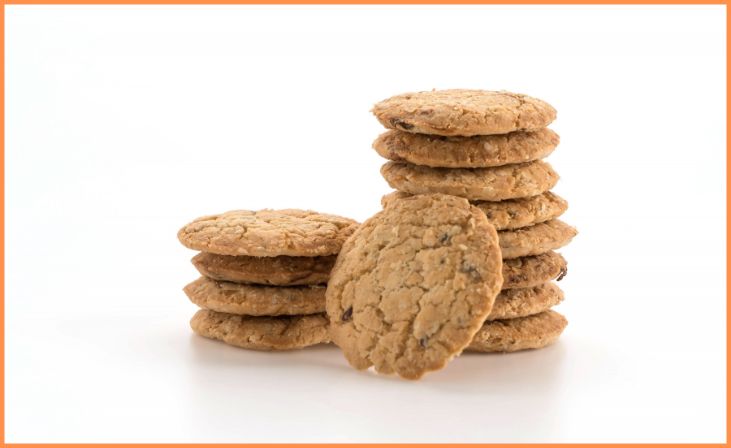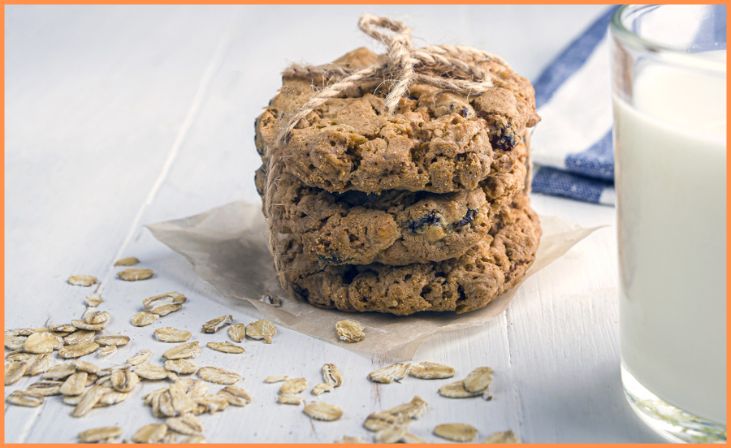Digestive Biscuits, cherished by many as a beloved snack, possess a rich history intertwined with health and flavor. Originally conceived in the early 19th century by two Scottish doctors with the intention of aiding digestion, these biscuits have since evolved into a staple in pantries worldwide. As we embark on this journey to unravel the mysteries of Digestive Biscuits, we delve not only into their origins but also into their multifaceted composition and the myriad benefits they offer. Let’s delve into the story behind these biscuits, understand their composition, and explore the numerous advantages they offer.
The Story Behind Digestive Biscuits
Digestive Biscuits, originally developed in the early 19th century by two Scottish doctors, were intended to aid digestion. Over time, these biscuits gained popularity not just for their functional purpose but also for their delicious flavor and versatility. Today, they are enjoyed worldwide, with various adaptations to suit different tastes and dietary preferences.
Originally formulated to aid digestion, these biscuits quickly gained traction for their remarkable flavor and versatility. Over time, they evolved into a beloved snack enjoyed by people of all ages and backgrounds across the globe.
The tale of Digestive Biscuits begins with a noble pursuit: to alleviate digestive discomfort. Conceived by doctors seeking to provide relief to their patients, these biscuits were formulated with ingredients believed to promote digestive health. Over time, their popularity soared, transcending their medicinal origins to become a cherished snack enjoyed by people of all ages and backgrounds. From the quaint kitchens of Scotland to bustling markets around the globe, Digestive Biscuits have left an indelible mark on culinary history.
Understanding Digestive Biscuits

These biscuits typically consist of wholemeal wheat flour, sugar, malt extract, baking soda, and sometimes salt. While the classic version remains prevalent, there are now numerous variations available, including gluten-free and vegan options, catering to a diverse audience.
While the traditional recipe remains prevalent, manufacturers have introduced numerous variations to cater to diverse dietary needs and preferences. From gluten-free options to vegan-friendly alternatives, there’s a Digestive Biscuit suited for every palate.
Health Benefits of Digestive Biscuits
Improved Digestion
One of the primary purported benefits of Digestive Biscuits is their potential to aid digestion. The combination of wholemeal flour and fiber-rich ingredients can help regulate bowel movements and promote overall digestive health.
Boosted Nutrient Intake
Despite their modest size, Digestive Biscuits can contribute essential nutrients to your diet. They often contain vitamins and minerals like iron, calcium, and B vitamins, offering a convenient way to supplement your nutrient intake. Incorporating these biscuits into your diet provides a convenient way to supplement your nutrient intake and support overall health.
Weight Management

For those mindful of their weight, Digestive Biscuits can serve as a satisfying yet relatively low-calorie snack option. Their fiber content helps promote feelings of fullness, potentially curbing excessive calorie consumption and aiding in weight management efforts.
Also Read: The Ultimate Guide to Kansas City’s 10 Best Chicken BBQ
Ingredients of Digestive Biscuits
Key Components
The primary ingredients in Digestive Biscuits include wholemeal wheat flour, which provides fiber and nutrients, along with sugar for sweetness and energy. Additionally, malt extract and baking soda contribute to the biscuits’ characteristic flavor and texture.
Alternatives for Health-conscious Consumers
To cater to evolving dietary trends, manufacturers have introduced alternative formulations of Digestive Biscuits. These may include options with reduced sugar content, whole grain varieties, or alternatives made with natural sweeteners, providing health-conscious consumers with more choices than ever before.
Nutritional Value of Digestive Biscuits
Caloric Content
On average, a single Digestive Biscuit contains approximately 70 calories. While this may vary slightly depending on the brand and specific ingredients used, they generally offer a relatively low-calorie snack choice compared to other sweet treats.
Macronutrient Breakdown

Each biscuit typically provides a small amount of protein and fat, with the majority of calories coming from carbohydrates. This macronutrient profile makes Digestive Biscuits suitable for inclusion in a balanced diet, especially when consumed in moderation.
Micronutrient Contribution
In addition to macronutrients, Digestive Biscuits can also contribute micronutrients such as iron, calcium, and B vitamins. While the amounts may be modest, regular consumption can help bolster your overall nutrient intake, particularly if you have dietary restrictions or preferences.
Also Read: 15-Step Guide to Perfect Lentil and Potato Stew
Conclusion: Digestive Biscuits
In essence, Digestive Biscuits represent more than just a snack; they embody a balance between flavor and wellness. As we conclude our exploration into these delightful treats, it becomes evident that they offer a plethora of advantages beyond mere taste. Whether you’re seeking to enhance your digestive health, fortify your nutrient intake, or simply indulge in a guilt-free pleasure, Digestive Biscuits stand as a versatile and beneficial option.
Their versatility extends not only to their nutritional composition but also to their adaptability to various dietary preferences. From classic formulations to gluten-free and vegan alternatives, Digestive Biscuits cater to a diverse array of needs and desires, ensuring that everyone can partake in their goodness.
FAQs
Are Digestive Biscuits suitable for individuals with gluten intolerance?
Yes, there are gluten-free versions of Digestive Biscuits available, making them suitable for those with gluten intolerance or celiac disease.
Can Digestive Biscuits help with weight loss?
While they can be included as part of a balanced diet, Digestive Biscuits alone are unlikely to cause significant weight loss. However, they can be a satisfying snack option that may aid in portion control and satiety.
Are there any potential downsides to consuming Digestive Biscuits?
Like any food, Digestive Biscuits should be enjoyed in moderation as part of a balanced diet. While they offer certain nutritional benefits, excessive consumption may contribute to excessive calorie intake or sugar consumption.
Do Digestive Biscuits contain artificial additives or preservatives?
It depends on the specific brand and formulation. Some Digestive Biscuits may contain additives or preservatives to enhance shelf life or flavor, while others prioritize natural ingredients.
Are Digestive Biscuits suitable for vegetarians and vegans?
Many Digestive Biscuits are suitable for vegetarians, but it’s essential to check the ingredients list for any animal-derived components. Additionally, there are vegan-friendly versions available for those following a plant-based diet.


